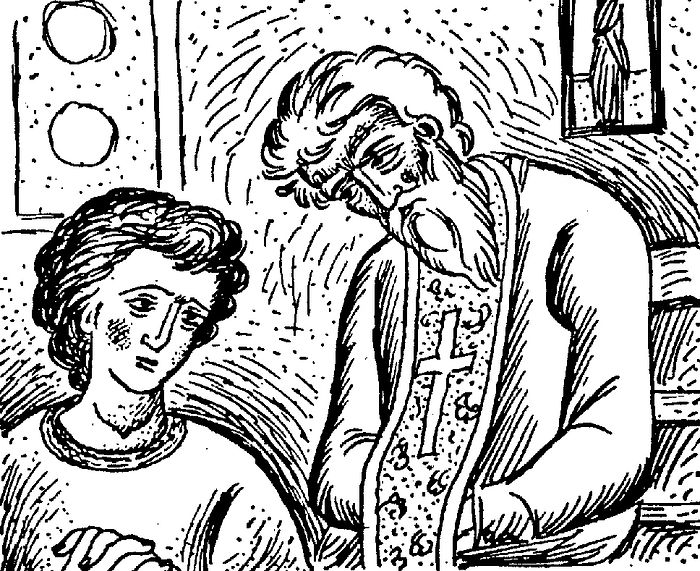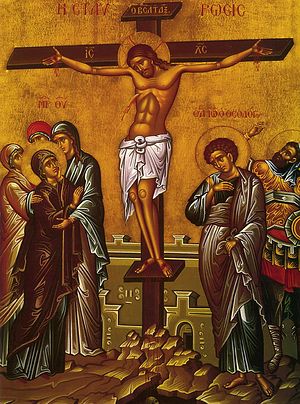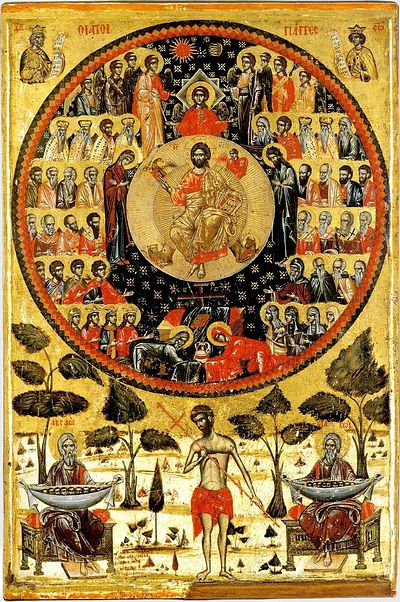From the time of our youth we are taught obedience. We are, of course, taught to be obedient to our parents, to our teachers, to the law, and to our employers when we enter into the work force. We know that obedience in such cases is a necessary part of life which keeps good order in our families and in the broader society. However, there is also a strong sense of individualized self-sufficiency in American culture. We don’t like to be told what to do – “no one’s going to tell me what to do!” We tend to view obedience as a burden, but as we see in the Epistles of the great Apostle St. Paul, obedience is a necessary part of the Orthodox Christian life. But why is that?
The Problem
Adam and Eve were created in a state of communion with God, and they were called to draw ever nearer to God and to grow in His likeness by the good use of their free will. They were given a commandment – not to eat of the Tree of the Knowledge of Good and Evil – in order to strengthen them in obedience to God, but they instead united their wills with that of the serpent, and turned from God in disobedience. Speaking of Adam, St. Paul states: “For as by one man's disobedience many were made sinners” (Rom. 5:19), and earlier: “Wherefore, as by one man sin entered into the world, and death by sin; and so death passed upon all men, for that all have sinned” (Rom. 5:12). Sin and death are the spiritual enemies that infect us (1 Cor. 15:26), and disobedience is the root cause – that of Adam, and our own continual sins. St. John Chrysostom asks: “What armed death against the world?” and he replies: “The one man’s eating from the tree only.”1
The Solution
Man’s free will was never lost, and so we see many righteous people in the Old Testament who were obedient to the commandments of God in the Mosaic Law (cf. Heb. 11), but one of the constant themes in St. Paul’s Epistles is the Law’s inability to justify us before God (see for example Rom. 3:20ff., Gal. 2:16, Heb. 7:19). So God, in His great love for mankind and in His desire to save all men (1 Tim. 2:4), sent His only-begotten Son to do that which the Law could not do – to condemn sin the flesh (Rom. 8:3). Christ became flesh for us men and for our salvation out of obedience to the Father. “He humbled Himself, and became obedient unto death, even the death of the cross” (Phil. 2:8), and therefore His name is exalted above every name (2:9), and He has become the author of our salvation (Heb. 5:8-9): “so by the obedience of One shall many be made righteous” (Rom. 5:19). Whereas the first Adam introduced sin and death into the world through his disobedience, the Second Adam, Christ our God, grants life to the world through His perfect obedience. And Christ was not obedient to the Father out of any sense of slavery, but out of His immeasurable love for the Father, and for us, who He laid down His life to save.
Our Participation
So now we see why obedience is so important for the Orthodox spiritual life. Disobedience leads to sin and death, but the obedience of Christ leads us to righteousness and eternal life. St. Paul states: “Know ye not, that to whom ye yield yourselves servants to obey, his servants ye are to whom ye obey; whether of sin unto death, or of obedience unto righteousness?” (Rom. 6:16). Christ’s obedience restores the possibility of the communion with Him that Adam and Eve lost in the Garden, but we still have our free will – God will not force us to accept the fruits of His obedience. And this is why obedience is so crucial for an authentic spiritual life – because humble obedience likens us unto Christ and grants us participation in His obedience. The Fathers of the Church tell us that the root of Adam’s disobedience was self-love, but obedience is rooted not in slavery, but in love for God and others. St. Paul exclaims: “Stand fast therefore in the liberty wherewith Christ hath made us free” (Gal. 5:1). St. Maximus the Confessor states that “desire, pure of the passion of self-love, ought to be driven by yearning for God alone,” for “[l]ove alone, properly speaking, proves that the human person is in the image of the Creator.”2
Who Are We to Obey?
Obedience is a constant theme in the writings of St. Paul. That he discusses it again and again in all of his Epistles tells us undoubtedly that it is a centrality in the Christian life. He speaks of many relationships in which we humbly and lovingly offer our obedience, which heals us of the misuse of our will and guides us to Christ and His will:
-
Children to their parents: “Children, obey your parents in the Lord: for this is right … That it may be well with thee, and thou mayest live long on the earth” (Eph. 6:1, 3). Cf. Col. 3:20.
-
Wives to their husbands: Eph. 5:22-24, Col. 3:18, Titus 2:5. It is important to note that St. Paul is not exhibiting any sexist attitude here, for the husband is likewise called to love his wife sacrificially, just as Christ loves the Church (Eph. 5:25, 28; Col. 3:19).
-
Servants to their masters: In our own days this may be likened to the obedience of employees to their employers. “Let as many servants as are under the yoke count their own masters worthy of all honour, that the name of God and his doctrine be not blasphemed” (1 Tim. 6:1). Cf. Eph. 6:5, Titus 2:9.
-
Citizens to the government: “Let every soul be subject unto the higher powers. For there is no power but of God: the powers that be are ordained of God” (Rom. 13:1). Cf. Rom. 13:2-7, 1 Timothy 2:1-2, Titus 3:1.
-
Christians to the Church and the Gospel: This one is obvious! We are to humbly obey the teachings of Christ’s Church and Her authorities. See for example 1 Cor. 11:1, 11:23, 15:3, 16:16; Gal. 5:7; 2 Thess. 1:8, 2:15; 1 Tim. 5:1; Heb. 13:7, 13:17.
-
Christians to Christ: This one is even more obvious! Christ is our Creator and Savior Who desires only the good things of salvation for us. To adhere to His will is to know His unspeakable love and to be filled with the fullness of God (Eph. 3:19). Cf. 1 Cor. 11:1, 2 Cor. 10:5-6, Heb. 2:8.
Freedom in Christ
St. Paul never despairs in the call to obedience. Quite the contrary – he delights in his servitude to Christ! (See for example Rom. 1:1; Eph. 4:1; Philemon 1:1, 1:9). He delights in his servitude, because he knows that in this is his freedom, from Satan, sin and death. He states: “For he that is called in the Lord, being a servant, is the Lord's freeman: likewise also he that is called, being free, is Christ's servant” (1 Cor. 7:22; cf. Gal. 5:1). Christ’s obedience overcame the disobedience of Adam and its universal consequences, and when we lovingly turn to Christ in imitation of Him we enter His Life. So why are we called to obedience? Because obedience, born out of love, is the key to becoming like Christ.







Could I humbly suggest to expand a little about the obedience due to the power that be, in consideration of the fact that the almost totality of governments in the world today openly promote the abomination to straighten the path for the antichrist?
Otherwise we little ones could think we owe obedience to Sodom and its statutes, or must submit to the ritual sacrifices of unborn children to Baal, or must renounce to publicly confess our Faith and raise our children acording to God's Statutes.
Furthermore, it's high time to stop noting everytime that it's not sexist to remind that wives must obey and submit to their husbands. Frankly, it's sickening. It's like apologizing every time we remind a God's decree (Genesis 3, 16).